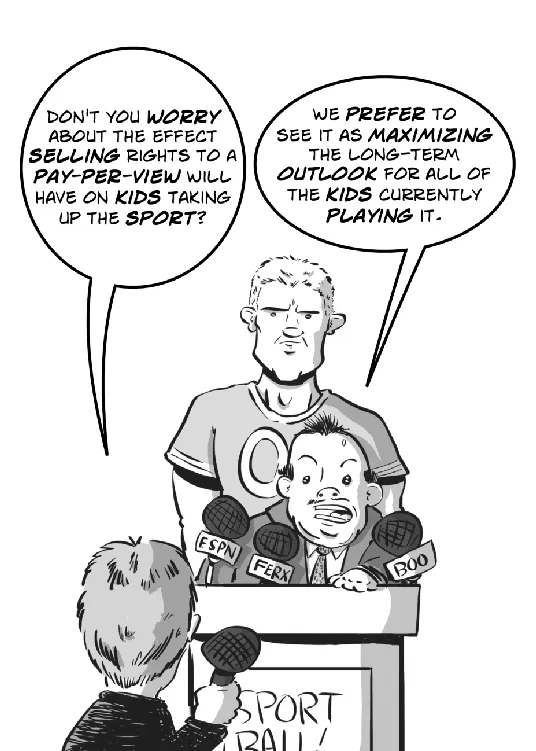
eBook - ePub
Thinkonomics
Illustrated Critical Thinking Articles
Robert A. Johnson
This is a test
Buch teilen
- English
- ePUB (handyfreundlich)
- Über iOS und Android verfügbar
eBook - ePub
Thinkonomics
Illustrated Critical Thinking Articles
Robert A. Johnson
Angaben zum Buch
Buchvorschau
Inhaltsverzeichnis
Quellenangaben
Über dieses Buch
What should we really think about nuclear weapons? Has the music industry gone one step too far? Should we farm free range humans?! Whilst you can't always answer the big - or small - questions in society, critically examining them allows you to better inform your opinions. Herein lies a plethora of critical thinking exercises to challenge your assumptions on a whole manner of things you almost certainly already have an opinion on. These beautifully illustrated critical thinking articles will take your thinking so far out of the box, you'll forget there even is one.
Häufig gestellte Fragen
Wie kann ich mein Abo kündigen?
Gehe einfach zum Kontobereich in den Einstellungen und klicke auf „Abo kündigen“ – ganz einfach. Nachdem du gekündigt hast, bleibt deine Mitgliedschaft für den verbleibenden Abozeitraum, den du bereits bezahlt hast, aktiv. Mehr Informationen hier.
(Wie) Kann ich Bücher herunterladen?
Derzeit stehen all unsere auf Mobilgeräte reagierenden ePub-Bücher zum Download über die App zur Verfügung. Die meisten unserer PDFs stehen ebenfalls zum Download bereit; wir arbeiten daran, auch die übrigen PDFs zum Download anzubieten, bei denen dies aktuell noch nicht möglich ist. Weitere Informationen hier.
Welcher Unterschied besteht bei den Preisen zwischen den Aboplänen?
Mit beiden Aboplänen erhältst du vollen Zugang zur Bibliothek und allen Funktionen von Perlego. Die einzigen Unterschiede bestehen im Preis und dem Abozeitraum: Mit dem Jahresabo sparst du auf 12 Monate gerechnet im Vergleich zum Monatsabo rund 30 %.
Was ist Perlego?
Wir sind ein Online-Abodienst für Lehrbücher, bei dem du für weniger als den Preis eines einzelnen Buches pro Monat Zugang zu einer ganzen Online-Bibliothek erhältst. Mit über 1 Million Büchern zu über 1.000 verschiedenen Themen haben wir bestimmt alles, was du brauchst! Weitere Informationen hier.
Unterstützt Perlego Text-zu-Sprache?
Achte auf das Symbol zum Vorlesen in deinem nächsten Buch, um zu sehen, ob du es dir auch anhören kannst. Bei diesem Tool wird dir Text laut vorgelesen, wobei der Text beim Vorlesen auch grafisch hervorgehoben wird. Du kannst das Vorlesen jederzeit anhalten, beschleunigen und verlangsamen. Weitere Informationen hier.
Ist Thinkonomics als Online-PDF/ePub verfügbar?
Ja, du hast Zugang zu Thinkonomics von Robert A. Johnson im PDF- und/oder ePub-Format sowie zu anderen beliebten Büchern aus Filosofia & Filosofia etica e morale. Aus unserem Katalog stehen dir über 1 Million Bücher zur Verfügung.
Information
Thema
Filosofiacontents
introduction
should music be free?
what will become of the ‘gentleman’s game’?
what is ‘vision’ and why do politicians not have it?
is mass political involvement/passion a good thing?
what effect does ‘media balance’ have?
are nuclear weapons good for the world?
can a refusal to use nuclear weapons ruin the deterrent?
why are we all so easily fooled by placebos?
should we be pro-choice or pro-life?
the moral worry in criminal allegations that we all like to ignore
prejudice or health promotion?
do we ask the wrong questions about public services?
how far should we expand ethics?
are we wrong about transgenderism?
what are men’s rights activists missing?
is sentience a spectrum?
is separating races the best way to attack racism?
how do we ensure a neutral media?
things i believe that are probably false or correlations i have not examined the causation for
do analogies work?
is consciousness mysterious?
can computers become conscious? and should we be worried?
paradoxes probably don’t exist
does the subjective nature of ethics doom rational government and economics?
is your brain entirely reliant on context?
obsession with culture over humankind
should the olympics be modernised?
what are the rules of satire?
why is the absurd funny?
why do we embrace labels, but not evidence?
waste and the back of a sofa analogy
what’s in a word?
why you shouldn’t demonise economic growth

introduction
There’s something innately funny and obvious about human bias. I fail to remember how many comedy sketches I have seen where one person tries in vain to crack a difficult lock, or to cut through a reinforced window, pulling the audience into his immense struggle, whilst his ally looks on – puzzled – right before turning the handle on the unlocked door.
Part of the reason that kind of sketch is so popular is because we relate. We’re a species of smart, rational apes, who regularly miscalculate the level or type of reasoning needed for any given situation. We’re capable of the most immense achievements imaginable, from space flight to ingenious medical techniques, yet reasonably often we’ll set about trying to solve an impossible problem when a simpler way around it was facing us all the time. Likewise, when faced with impossible questions, which should beget uncertainty, we settle for simple, certain answers.
These essays and drawings are a way of celebrating this quirk, but more than that, are an attempt to get you thinking about and questioning all manner of interesting things you may not have realised are even up for debate. From important matters such as politics and economics, or more general topics such as comedy or arts, herein lies a wide variety of critical thinking topics.
But don’t be fooled into thinking this is some sort of guide to revolutionary thinking about society; it isn’t. Whilst I think some of these short pieces sum up unique and often ignored problems that few actually think about, others are putting a genuine debate across: not because I always disagree with how we currently think about the matter, but because I think we should consider things critically and challenge ourselves to defend our ideas. Even if they were right all along.
There is no necessary connection, from start to finish, other than that each article is putting forward an opinion or a debate which is often ignored ...